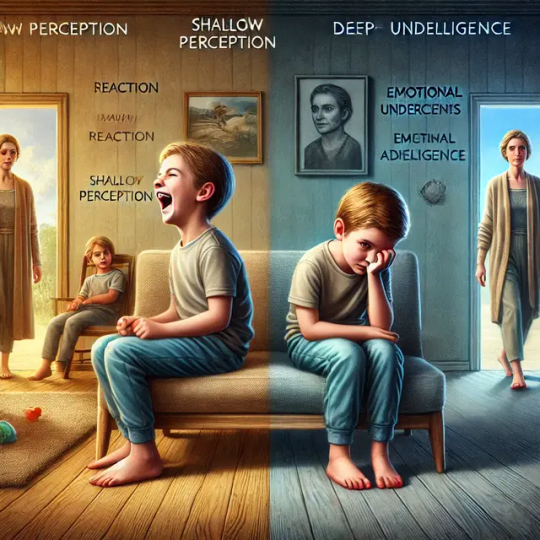#ObservationalThinking
Explore tagged Tumblr posts
Text
Perception > Intelligence: The Hidden Key to Understanding Reality

We live in a world that worships intelligence. Test scores, degrees, IQ, algorithms—our society measures success by how efficiently a person or system can process information. But what if we’ve been looking at it all wrong? What if intelligence is just raw processing speed, and the true key to understanding reality is something deeper? Something more fundamental? That key is perception.
Intelligence without perception is like having the fastest computer in the world but running bad code. It doesn’t matter how quickly you compute if your inputs are flawed. Without perception, intelligence is blind. And nothing illustrates this better than a moment I witnessed as a child—a moment that stuck with me and revealed just how different perception levels shape reality.
Picture this: My twin brother and I are playing in the living room. Our parents are on the couch, watching a football game. The room is alive with energy, laughter, and the hum of the TV. At some point, my stepdad realizes he wants another beer. Without hesitation, he says, “Beer me, winch.” He laughs. My brother, picking up on the cue, echoes his laughter, repeating the phrase. I sit in silence, observing, watching, processing.
My mom hesitantly gets up, goes to the kitchen, and grabs him a beer. She brings it back. As she walks away, my stepdad slaps her on the ass. He laughs again. My brother laughs again. I stay silent. Something about this isn’t sitting right with me. I watch my mom's face. She doesn’t react outwardly—no words, no confrontation—but I catch the microexpression, the slight hesitation in her movements. A moment later, she quietly walks off and disappears into her room. My stepdad doesn’t notice. My brother doesn’t notice. But I do. I don’t say anything. I just sit with it, watching, processing, understanding.
That moment stuck with me for life—not because of the action itself, but because it revealed something deeper: not everyone sees reality the same way. My stepdad was blind to the impact of his actions. He was running on habit, following a learned behavior pattern, never questioning it. My brother was just a mimic. He absorbed the loudest signals in the room and mirrored them, never stopping to perceive what was beneath the surface. My mother felt everything but stayed silent. She had the perception, but whether from societal conditioning, exhaustion, or something deeper, she didn’t challenge it. I saw the whole thing for what it was. I saw not just the actions, but the emotional undercurrents, the dynamics at play, the silent messages that were being reinforced without a word being spoken.
This is where perception outweighs intelligence. My brother and I had the same genetic material, the same IQ, the same childhood environment—yet we perceived that moment entirely differently. That’s the key. Perception shapes intelligence, not the other way around.
Society conditions us to think that intelligence is what separates people—the gifted from the average, the winners from the losers. But in reality, the biggest differentiator between those who “get it” and those who don’t isn’t intelligence—it’s perception. Think about it. Why do some people repeat the same toxic cycles without realizing it? Why do some people follow bad leaders, bad systems, or bad ideologies without question? Why do some people see massive paradigm shifts coming—Bitcoin, technological revolutions, social changes—while others stay oblivious? It’s not a matter of intelligence. It’s a matter of whether or not they are actually perceiving what’s happening around them.
You see this everywhere. The difference between someone who understands Bitcoin and someone who dismisses it isn’t intelligence—it’s perception. One person sees beyond the mainstream narrative and understands the shift happening, while the other just reacts to the surface-level noise. The difference between an average thinker and a visionary isn’t intelligence—it’s perception. Visionaries see hidden connections where others only see isolated events. The difference between someone trapped in a system and someone who escapes it isn’t intelligence—it’s perception. The escape comes from seeing what the system actually is, not just existing within it.
If perception is greater than intelligence, what does that mean for you? It means that if you want to truly level up, it’s not about just acquiring more knowledge—it’s about seeing more clearly. It’s about questioning your own assumptions, looking deeper into everything, and watching what others miss. Observing before reacting is crucial. Most people react instantly. If you can sit back, watch, and take in all the signals before you respond, you’ve already separated yourself from the masses. Questioning the obvious is another key. Why do people do what they do? Why do systems work the way they do? Who benefits? Most of the world runs on patterns people never question.
It’s also important to look for what’s not being said. The most important information isn’t always in words. It’s in body language, in hesitation, in avoidance, in silence. Detaching from emotion in the moment allows for clearer thinking. Emotions cloud perception. If you can step back, detach for just a second, and see a situation objectively, you gain a huge advantage. Connecting the dots across disciplines also sharpens perception. Perception is about seeing patterns—between history, psychology, economics, culture, and personal experience. The more you zoom out, the more you see the whole picture.
The world doesn’t belong to the smartest people. It belongs to the most perceptive. That’s why some people with genius-level IQs make terrible decisions—because intelligence alone isn’t enough. It’s why history is filled with people who were laughed at, ridiculed, and dismissed… only to be proven right later. They weren’t necessarily smarter. They just saw something others didn’t.
And once you see something, you can’t unsee it. The real question is: are you perceiving reality, or just running the script?
#Perception#Intelligence#Awareness#SelfAwareness#Philosophy#Mindset#CriticalThinking#Consciousness#RealityCheck#ObservationalThinking#Psychology#Society#Wisdom#GrowthMindset#Bitcoin#Truth#DeepThoughts#HumanBehavior#LifeLessons#WakeUp#SystemsThinking#RedPill#QuantumBrain#PersonalDevelopment#Visionary#TickTockNextBlock#financial education#blockchain#financial experts#financial empowerment
1 note
·
View note